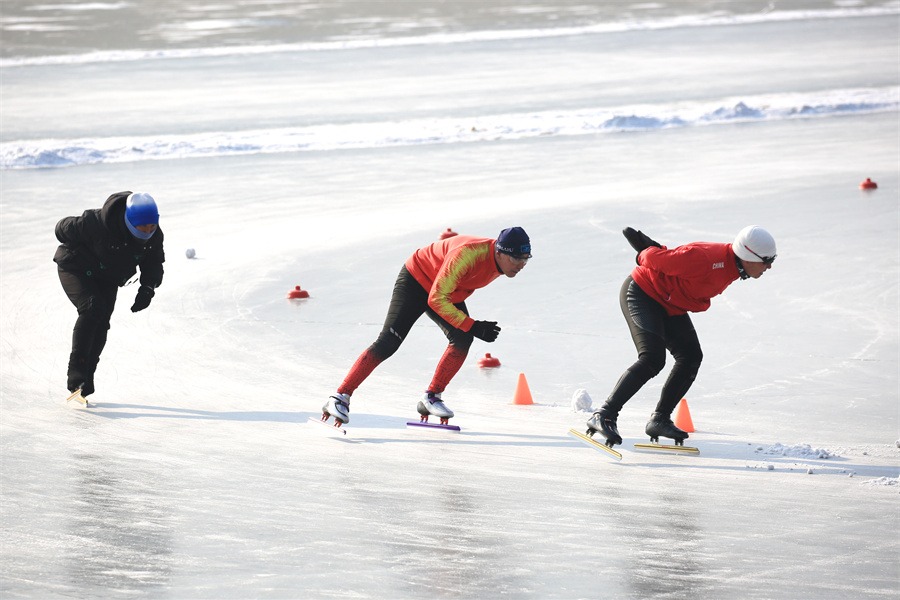Toil and joy of the long-distance farmer

Agricultural expert's work in africa gives him top distinction
Jiang Heping is one of 10 winners in the Fourth China-Africa Friendship Award, so naturally he is very excited.
In the past three years most Chinese winners have been medical-aid staff sent from China to Africa. But this year, for the first time, the evaluation committee has given the award to two agricultural experts, and Jiang is one of them.
 |
| In the past seven years, Jiang Heping has been to Africa 15 times, each time bringing with him the agricultural experts and technology. PROVIDED TO CHINA DAILY |
The China-Africa Friendship Award, initiated by the Chinese People's Association for Friendship with Foreign Countries in 2006, is to commend individuals and groups from China and Africa who have made an outstanding contribution in promoting Sino-African friendship.
What makes Jiang's award all the more outstanding is that his fellow Chinese recipient is Yuan Longping, an agricultural expert widely known as the father of hybrid rice.
Jiang, in his mid-50s, is the director of the Department of Agro-Technical Economics and Scientific and Technological Development at the Institute of Agricultural Economics in Beijing and a professor at the Chinese Academy of Agricultural Sciences.
He is also the associate secretary-general of the Society of Agro-technological Economics and the trustee of China Agricultural Economics Association.
The awards will be presented in the Great Hall of the People in Beijing on Dec 21, but Jiang says that what is most important for him is to do even better things in Africa, a place that for him means not only work, but friends and life.
"I hope I can bring more information to Chinese companies that are interested in developing agricultural business in Africa, and bring more experienced Chinese farmers to the land to really build up an agricultural lifestyle in Africa through daily work," Jiang says.
Jiang first went to Africa a little more than six years ago, in a delegation to Angola led by Premier Wen Jiabao. The trip was only a part of many programs of Chinese agricultural aid to Africa, but it stoked Jiang's interest in the continent.
Within 18 months of working with other experts from the delegation, Jiang finished a report titled Planning for Agricultural Development in Angola, which was approved by the Angolan government. The report helped the country gain aid from the European Union and the United States.
In the past seven years Jiang has been to Africa 15 times and visited 12 countries. He says he will never forget a talk he had with Venancio Massingue, the minister of Science and Technology in Mozambique.
Jiang says Massingue told him that Mozambicans used to demand guns and cannons, but today they need food and meat.
The minister thanked Jiang for taking an agricultural expert team to his country and planning an agricultural technology demonstration center for them. It really helped solve problems the country faced, including poverty and an underdeveloped agricultural industry, he said.
Massingue told him he expected to work with Chinese experts and start on a China-Mozambique agricultural technology demonstration center as soon as possible. "It's amazing to see how my work has been able to help them push local economic development," Jiang says.
Among the 20 agricultural technology demonstration centers that China is setting up in African countries, Jiang helped plan eight of the programs, from selecting the sites and doing field studies to writing feasibility reports.
His feasibility report has become the template for such centers, and his reports on agriculture have been used as reference texts in many African countries.
Jiang, who has been a diabetic for many years, has shouldered a heavy burden in his treks to Africa, tolerating poor living conditions and suffering many difficulties that most people cannot even imagine, the Chinese Academy of Agricultural Sciences says.
For example, Jiang cannot always find refrigerators to cool his insulin injections, meaning he has sometimes had to rely on non-refrigerated injections, which are regarded as inferior.
The academy says he once collapsed on his way to a field study because of a lack of food.
Several months ago, one of his best friends, also an agricultural expert from China, died of malaria in Africa, he says.
"We were talking on the phone before I headed back to China in May, and he died no more than 10 days after that. There is no doubt that the bad environment contributes to the difficulty of our work in Africa."
Jiang says Chinese agricultural aid programs should invite more experienced farmers from the mainland to live and work in Africa, as do experts from Taiwan.
"In addition to our experts' technological supervision, those experienced farmers are able to teach Africans by example and by word of mouth. That would help bring about lifestyle changes that can support the development of agriculture in Africa."
Besides his activities in Africa, Jiang also provides information about Africa to Chinese companies that want to operate there.
"I can offer the technologies companies need in Africa to carry out agricultural activities, and also help them when they want support from Chinese embassies in African countries, since I have been worked with Chinese agencies for many years," he says, adding that he feels like a bridge linking more Chinese investment to Africa.
Jiang says there are abundant agricultural resources in Africa, but most rely on imported food, especially grains.
To countries heavily reliant on a limited range of products, Jiang delivers technology and knowledge, the aim being to diversify local agricultural and solve the problems of hunger.
For example, Jiang says, Cote d'lvoire, which once depended on coffee and cocoa, now grows rice and grain sorghum.
"However, to solve the problems of poverty and hunger, one of the biggest things in most of Africa is to build a stable social environment without political disputes."
Jiang cites Mali, once considered the African model par excellence for building a national agricultural system. But having achieved that, Malians were forced to start importing food again last year because of political upheaval.
It usually takes six years to build and fully hand over to local governments the agricultural technology demonstration centers with which China helps, and even then anxiety about what will happen to them does not end.
"Because of the unstable social environment and a lack of local know-how, it is hard to sustain most agricultural technology demonstration centers," Jiang says.
"It would be better to have a longer settling-in period and to bring in more Chinese companies to help local governments run them."
Today's Top News
- AI curbs show Biden's rejection of cooperation: China Daily editorial
- Global medical minds unleash hospital innovation trends
- Xi holds phone talks with Vietnam's top leader To Lam
- Chinese, Sri Lankan presidents hold talks in Beijing
- Xi's article on further deepening reform comprehensively to be published
- China-UK dialogue outcomes will enable them to reboot relationship






























